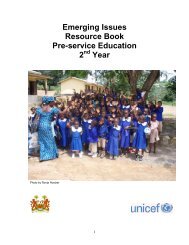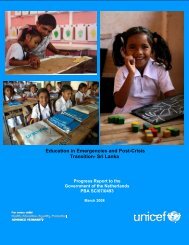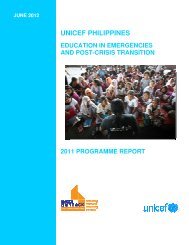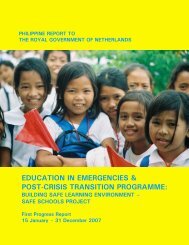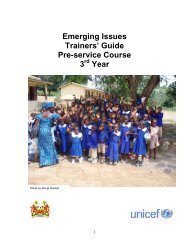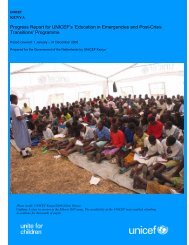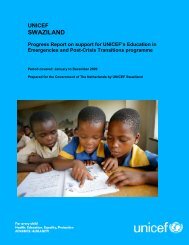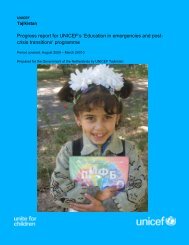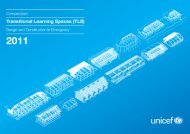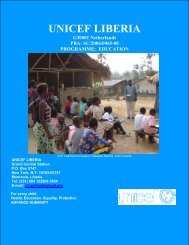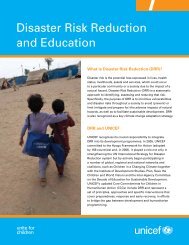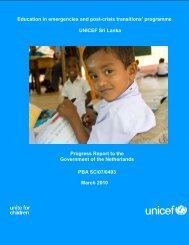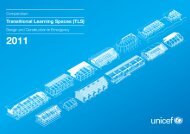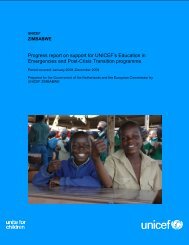Disaster Risk Reduction in School Curricula: Case Studies ... - Unicef
Disaster Risk Reduction in School Curricula: Case Studies ... - Unicef
Disaster Risk Reduction in School Curricula: Case Studies ... - Unicef
Create successful ePaper yourself
Turn your PDF publications into a flip-book with our unique Google optimized e-Paper software.
128<br />
Section 10.<br />
<strong>Case</strong> 15:<br />
The <strong>Case</strong> <strong>Studies</strong><br />
Malawi<br />
Overview<br />
Malawi has not yet employed disaster risk<br />
reduction as a guid<strong>in</strong>g concept for<br />
curriculum development, but address<strong>in</strong>g<br />
vulnerabilities is already prom<strong>in</strong>ent <strong>in</strong> a<br />
curriculum uniquely <strong>in</strong>formed by ‘seven<br />
ma<strong>in</strong> categories of skills’. Among a<br />
number of opportunities for <strong>in</strong>tegrat<strong>in</strong>g<br />
DRR and climate change themes <strong>in</strong> the<br />
curriculum, Life Skills Education, which<br />
emphasizes ‘psycho-social skills’, seems<br />
to offer fertile ground. Malawi is already<br />
employ<strong>in</strong>g cont<strong>in</strong>uous assessment and<br />
the Child Friendly <strong>School</strong>s model at the<br />
primary level, thus further prepar<strong>in</strong>g<br />
the ground for effective DRR<br />
education implementation.<br />
Introduction<br />
Malawi’s school curriculum is <strong>in</strong>formed by seven overarch<strong>in</strong>g<br />
national skills categories: 1. citizenship skills; 2. ethical and<br />
socio-cultural skills; 3. economic development and environmental<br />
management skills; 4. occupational and entrepreneurship skills;<br />
5. practical skills; 6. creativity and resourcefulness skills; 7.<br />
scientific and technological development skills (Malawi Institute<br />
of Education, 2004). Each of these seven overarch<strong>in</strong>g categories<br />
of skills translates <strong>in</strong>to detailed outcomes for primary education<br />
and objectives for secondary education. (In Malawi, the new<br />
primary school curriculum, grades 1-8, is outcomes-based and<br />
the secondary curriculum, grades 9-12, is objectives-based) 66 .<br />
In the Malawi curriculum documentation, the notion of ‘skills’<br />
is used loosely to encompass competencies related to knowledge,<br />
skills, attitudes, values and behaviour.<br />
At the primary level, these overarch<strong>in</strong>g seven categories of<br />
skills translate <strong>in</strong>to eight development outcomes to be achieved<br />
by the end of primary education. A number of the<br />
development outcomes are particularly relevant to competencies<br />
identified <strong>in</strong> literature on DRR education. They <strong>in</strong>clude: ‘communicate<br />
competently, effectively and relevantly <strong>in</strong> a variety<br />
of contexts and <strong>in</strong> multiple languages’; ‘produce product<br />
and solutions through Science and Technology <strong>in</strong> a creative<br />
way and demonstrate respect for the environment to solve<br />
problems’(sic.); ‘demonstrate health promot<strong>in</strong>g behaviour <strong>in</strong><br />
their personal lives as well as their communities and wider<br />
environment with particular attention to prevalent diseases<br />
such as malaria, sexually-transmitted diseases and HIV and<br />
AIDS’; ‘observe, <strong>in</strong>teract with the natural and physical environment<br />
<strong>in</strong> order to understand and make use of their <strong>in</strong>terrelationship<br />
<strong>in</strong> a responsible and appreciative manner’ (Malawi Institute of<br />
Education, 2005 a, b, c, d, 2007 a, b, c).<br />
A total of 68 objectives are put forth for secondary education.<br />
Some of the objectives also run parallel to competencies observed<br />
<strong>in</strong> literature on DRR education. For example, <strong>in</strong> the<br />
category of ‘citizenship skills,’ students are expected to ‘acquire<br />
decision-mak<strong>in</strong>g skills necessary for participation <strong>in</strong> civic<br />
affairs,’ to ‘<strong>in</strong>itiate and implement community projects,’ to ‘develop<br />
personal and social responsibility,’ and to ‘demonstrate a spirit<br />
of leadership and service.’ (Malawi Institute of Education,<br />
2004, iv-v). Under the category of ‘economic development<br />
and environment management skills’ appear a few objectives<br />
concern<strong>in</strong>g understand<strong>in</strong>g of Malawi’s natural resources and<br />
natural conservation as well as the application of environmental<br />
resource management and agriculture practices (36-41, 44).<br />
The ‘creativity and resourcefulness skills’ require students<br />
to ‘apply problem-solv<strong>in</strong>g techniques to new situations’ (56),<br />
to ‘develop the ability to maximize the use of available resources’<br />
(60) and to ‘develop the spirit of <strong>in</strong>quiry and <strong>in</strong>dependent th<strong>in</strong>k<strong>in</strong>g’<br />
(61) (Malawi Institute of Education, 2004, iv-v).<br />
In Malawi’s spiral competency-based curricula, each subject<br />
and grade-specific syllabus <strong>in</strong>cludes a ‘scope and sequence<br />
chart’ <strong>in</strong> which target skills (or competencies) are placed <strong>in</strong><br />
a specific order and sequenced so that they are re<strong>in</strong>forced and<br />
deepened grade by grade. Accompany<strong>in</strong>g each skills-oriented<br />
goal are topics, objectives (i.e., competencies which students<br />
obta<strong>in</strong>), contents, teach<strong>in</strong>g and learn<strong>in</strong>g methodologies, teach<strong>in</strong>g<br />
and learn<strong>in</strong>g resources and modes of assessment.<br />
66<br />
Alison Mhlanga, Malawi Institute of Education, to Fumiyo Kagawa,<br />
13 December 2011. Note: For the consistency of the report, Malawi’s<br />
curriculum ‘standard’ is called ‘grade’.<br />
<strong>Disaster</strong> <strong>Risk</strong> <strong>Reduction</strong> <strong>in</strong> <strong>School</strong> <strong>Curricula</strong>: <strong>Case</strong> <strong>Studies</strong> from Thirty Countries



